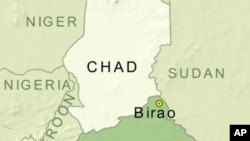Two aid workers, in Central African Republic were taken at gunpoint on Sunday from the town of Birao, a few kilometers from the borders of Chad and Sudan. The kidnappings are the latest in a string of attacks on international aid workers. Increasingly difficult conditions are seriously hampering aid operations to the region, which is flooded with refugees from Darfur as well as internally displaced people.
The east of Chad, Darfur and the north of the Central African Republic are roamed by bandits and highwaymen as well as rebel groups, and relief agencies in the region often have to navigate these precarious conditions.
These difficult situations are seriously hampering aid operations and often result in these organizations withdrawing from the region.
The area is so unstable that in a report by the International Crisis Group published in April this year, it was dubbed a powder keg.
Michel Falavigna is the U.N. Humanitarian Coordinator for Chad. He says humanitarian workers without escorts are easy targets for armed groups in the border region.
"Regrettably, NGOs that are without escorts, because of the principles of neutrality and impartiality that are upheld, become very soft targets for this type of criminals," he said.
Six aid groups temporarily withdrew from eastern Chad after a kidnapping on November 9, leaving 37,000 people without assistance.
In Sudan's strife-torn Darfur province, kidnapping of aid workers has become frequent. Two women working for the Irish charity Goal were kidnapped in July northwest of El-Fasher, the capital of North Darfur, before being freed in October.
Several other kidnappings of local or expatriate humanitarian staff have taken place this year, notably those of a French woman and a Canadian woman from the NGO AMI. Two Sudanese workers were killed.
The Chadian government, led by president Idriss Deby, accuses Sudan of supporting rebel movements in Chad. Sudan in turn accuses Chad of backing rebels on its territory.
In the Central African Republic on Sunday, two aid workers for the NGO Triangle were abducted at gunpoint. The French foreign ministry has called for their release and saying in a it "condemns this new criminal act which, once again, hits humanitarian workers in a region where NGO assistance to the population is primordial."
The workers were kidnapped in Birao, which is part of a zone watched by the United Nations Mission in the CAR and Chad, known as MINURCAT.
Its spokesperson, Elizabeth Byrs, says escorts are available to NGOs that ask for them.
But some international groups prefer to operate independently.
Byrs says MINURCAT has increased its air patrols to help protect NGOs operating in the region.
"MINURCAT has increased its air patrols with helicopter flights in the areas where the humanitarians operate," she said. "MINURCAT has also increased patrols in Abeche. They are also focusing on arresting people that have been identified to organize crimes in and around Abeche."
She also stressed a need to reinforce the capacities of MINURCAT, which was set up to protect refugees and internally displaced persons, however the mission has never fully been deployed.
In figures available from May this year, MINURCAT was operating at less than half its strength, with 2,115 out of 5,200 troops deployed to the field.
Marco Succi is the spokesperson for the International Committee of the Red Cross there.
He says that organization is one of the few still working there.
"We are one of the few organizations working there. And as you know, in our mandate we are compelled to have a dialogue with all of the arms carriers, including the armed opposition groups," said Succi.
There are fears among the humanitarian community that if the trend continues, more agencies will be forced to pull out, leaving thousands without assistance.
News
Aid Work Being Hampered by Kidnappings in Chad, CAR
- By Kate Thomas
update

Two aid workers, in Central African Republic were taken at gunpoint on Sunday from the town of Birao, a few kilometers from the borders of Chad and Sudan. The kidnappings are the latest in a string of attacks on international aid workers.



